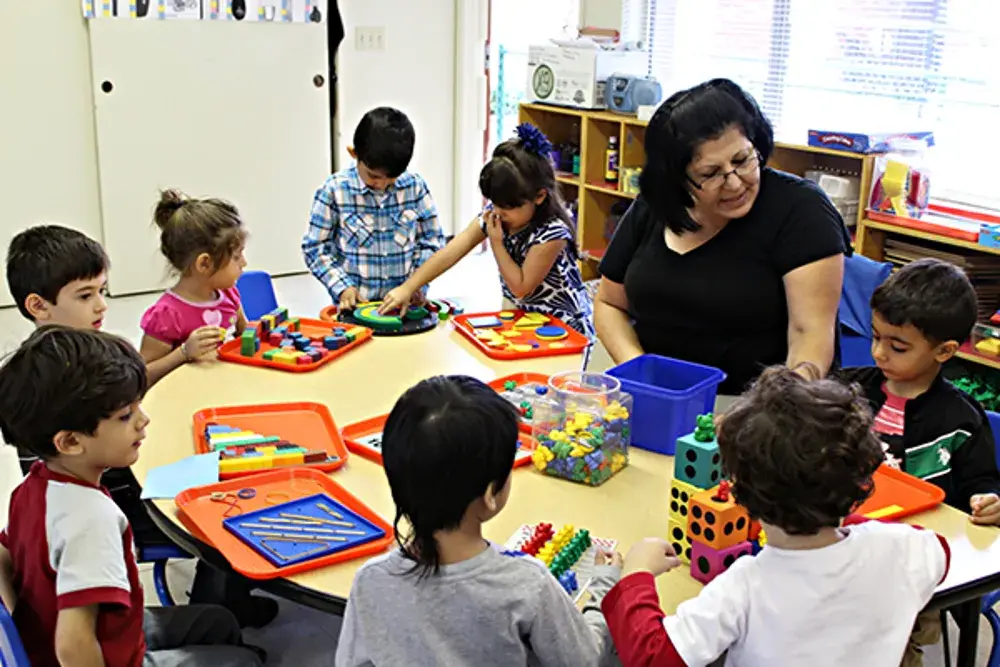What Subjects do you need to become a Nursery Teacher?

Source: edsource
What Subjects do you need to become a Nursery Teacher?
Embarking on a journey to become a nursery teacher is both exciting and demanding.
But one would always wonder as to what subjects do you need to become a Nursery Teacher?
It requires a keen understanding of various Subjects to become nursery teacher which form the core of early childhood education. These subjects are not just about academic content; they encompass a broad spectrum of knowledge and skills essential for nurturing young minds.
From understanding child development and psychology to mastering the art of curriculum planning, these Subjects to become nursery teacher are designed to equip aspiring educators with the tools they need to create a stimulating and supportive learning environment for pre-schoolers.
This blog aims to shed light precisely on what subjects do you need to become a Nursery Teacher? And guide you through the essentials of what it takes to be a successful nursery teacher.
Table of Content
- Module I: Child Development & Psychology
- Module II: Organizing Child Care Services
- Module III: Children with Behavior & Learning Difficulties
- Module IV: Child Health & Nutrition
- Module V: Working With Children
- Module VI: School Administration and Management
- Module VII: Programme Planning and Organization
- Module VIII: Curriculum Framework for Pre-School
- Module IX: Planning Thematic Curriculum
- Which institute is best for NTT?

Source: parentmap
Module I: Child Development & Psychology
The Basic fundamental topic of ECCE is to understand child development & Psychology to be able to cater to them efficiently.
- Basic Concepts in Child Development: Gain an in-depth understanding of the physical, cognitive, emotional, and social development milestones from birth to preschool age. This includes recognizing how children grow and change at different stages.
- Development Stages: Study the specific developmental traits and needs during neonatal, infancy, toddlerhood, and preschool stages, focusing on how children learn and interact with their environment at each phase.
- Play: Learn about the critical role of play in learning and development, including different types of play and how they aid in cognitive, physical, and social skills.
- Parenting Styles: Explore how different parenting styles (authoritative, authoritarian, permissive, and uninvolved) impact child Behavior and development.
- Personality & Intelligence: Understand the formation of personality and intelligence in early childhood, including theories of multiple intelligences and temperament.
- Motivation & Reinforcement: Study techniques to motivate children and the use of positive reinforcement to encourage desirable behaviours.
- Discipline: Learn effective and compassionate discipline strategies that promote self-control and responsibility in young children.
Module II: Organizing Child Care Services
Organising child care services is one of the upcoming gainful careers but requires thorough understanding to the nuances of the topic.
- Early Childhood / Pre-School Education: Examine the foundations of early childhood education, including developmental-appropriate practices and learning theories.
- Management & Administration: Understand the operational aspects of running an early childhood centre, including staffing, budgeting, and regulatory compliance.
- Child Education: Explore diverse teaching methodologies tailored to young learners.
- Curriculum Planning: Learn to design engaging, age-appropriate curricula that stimulate all areas of development.
- Readiness: Techniques for assessing and fostering readiness for formal schooling.
- Evaluation: Develop skills in assessing children’s progress through observation and other assessment tools.
- Parent-Teacher Cooperation: Strategies to build effective partnerships with parents, including communication and involvement in the educational process.
Reach us at +919869546913 / +919869866277 to get an answer to all your doubts.
The brochure is available at the below link. Click Here to download it.

Source: todaysparent
Module III: Children with Behavior & Learning Difficulties
To make the system more inclusive understanding children with behavior and learning difficulties is a must.
- Behavior Difficulties: Identification, understanding, and intervention strategies for children with behavioural challenges.
- Speech Problems: Techniques for recognizing and supporting children with speech and language delays.
- Learning Disorders: Understand and support children with dyslexia, ADHD, and other learning difficulties.
- Gifted Children: Recognize and nurture the abilities of gifted children, providing them with challenging and stimulating learning opportunities.
Module IV: Child Health & Nutrition
Food, Nutrition, and Health: Understand the basics of child nutrition and its critical role in overall health and development.
- Balanced Diet & Nutrients: Learn to plan and provide nutritious meals that meet the dietary needs of young children.
- Immunization: Knowledge of immunization schedules and the importance of vaccines in child health.
- Childhood Illnesses: Identify common childhood illnesses and appropriate care strategies, including first aid.
- Health Care Role in School: Promote and maintain a healthy environment in the educational setting.
Module V: Working With Children
- Nurturing Creativity: Explore methods to foster creativity and imagination in children through various activities.
- Art, Story-Telling, Songs: Incorporate arts and music into daily activities, enhancing cognitive and emotional development.
- Planning Activities: Design and implement a range of educational and fun activities suitable for young children.
- Class Observation: Develop observational skills to assess children’s learning and behavior in the classroom.
Module VI: School Administration and Management
- Pedagogical Approaches: Study various teaching methods and how to apply them effectively in the classroom.
- Teacher Performance: Techniques for evaluating and improving teacher performance.
- Classroom Management: Strategies for creating a positive and productive learning environment.
- Teacher Recruitment and Training: Best practices for hiring and providing ongoing professional development for staff.
Reach us on +919869546913 / +919869866277 for any additional doubts regarding the course.
For the course brochure, Click Here to download it.

Source: expatica
Module VII: Programme Planning and Organization
This module of Programme planning and organization trains candidates with regard to creating a print-rich happy class environment.
- Learning Areas in Pre-School: Identify and utilize key learning areas within the preschool environment.
- Bulletin Boards: Learn how to use bulletin boards as an effective educational tool.
- School Program Planning: Develop comprehensive plans for school programs, including life skills education.
- ICT and Multimedia: Integrate technology to enhance learning experiences.
Module VIII: Curriculum Framework for Pre-School
Understanding the curricular framework for preschool is essential to design age-appropriate lessons for a younger age group.
- Understanding Developmental Characteristics: Tailor teaching strategies to suit the developmental stages of young children.
- Theme-Based Planning: Implement thematic learning for a more integrated educational approach.
- Teaching Learning Material: Create and utilize a variety of teaching materials to enhance the learning experience.
Module IX: Planning Thematic Curriculum
Planning thematic curriculum gives trainees insight into gaining proper understanding before taking on to any topic.
- Themes such as ‘My Body’, ‘Animals’, and ‘Water’: Develop and implement curriculum themes that are engaging and educational, focusing on real-world concepts.
In summary, to become a nursery teacher, one must deeply understand these subjects, embracing the nuances of early childhood education. This comprehensive study equips aspiring nursery teachers with the knowledge and skills necessary to create a nurturing, educational, and safe environment for young learners.
Which institute is best for NTT?
To become an accomplished Nursery Teacher, one will have a blazing question as to which Institute is best for NTT which will set their career in the right direction and proper motion.
So When it comes to selecting the best institute for Nursery Teacher Training (NTT), Vidhyanidhi Education Society stands out as the premier choice.
Here’s why:
Comprehensive Course Offerings
VES after studying the student requirements has come up with a wonderful array of 2 levels of NTT programs
- Diploma in NTT Programs for candidates who have just completed their 12th but aim to make a mark in the field of teaching.
- Post Graduate Diploma in NTT which demands a bachelor’s degree in any stream from a recognized university with 55% aggregate.
Eligibility and Accessibility
The minimum qualification required to enroll in these courses is a 10+2 education. This makes the courses highly accessible to a broad range of candidates. Additionally, any candidate who is 18 years old or above is eligible to enroll, opening doors for both fresh high school graduates and more mature learners.
Flexibility in Duration
The duration of the courses ranges from 1 to 2 years, accommodating both those who wish to fast-track their training and those who prefer a more relaxed pace. This flexibility is crucial for catering to students with varying time commitments and life circumstances.
Why Choose Vidhyanidhi Education Society
- Experienced Faculty: The faculty at Vidhyanidhi Education Society comprises of a team of leading maestros who have a humungous experience which they offer the students for a better professional journey.
- Practical Training: Alongside theoretical knowledge, the courses emphasize practical training, preparing students for the real-world challenges of a nursery teaching environment.
- Career Opportunities: Graduates of Vidhyanidhi Education Society’s NTT programs are well-regarded in the education sector, often finding rewarding career opportunities in prestigious institutions.
- Supportive Learning Environment: The Society is known for its supportive and nurturing learning environment, which is essential for the holistic development of future teachers.
Choosing Vidhyanidhi Education Society for Nursery Teacher Training equips aspiring educators with the skills, knowledge, and confidence to excel in their teaching careers. With its comprehensive course offerings, flexible durations, and emphasis on practical training, the Society is indeed the best choice for those aspiring to make a significant impact in early childhood education.
Become a Nursery Teacher
“Join us at Vidhyanidhi Education Society for a transformative NTT journey!”
Reach us on +919869546913 / +919869866277 for all your queries related to course.
For the brochure, Click Here to download it.
FAQs
What is the full form of NPTT in teaching?
NPTT stands for Nursery Primary Teacher Training offered by VES, focusing on early childhood education.
How to do NTT Course?
To do an NTT course, enroll in an accredited institute, complete coursework, and gain practical experience.
How much Nursery teachers get paid?
Nursery teachers' salaries vary, but in India, they typically earn between ₹15,000 to ₹30,000 per month.




